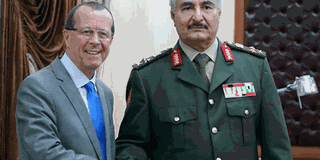Libya rival factions likely to sign deal for a unity government

General Khalifa Haftar (right), commander of the armed forces loyal of the internationally recognised Libyan government, shakes hands with UN envoy Martin Kobler, the head of the UN Support Mission in Libya, in the eastern town of al-Marj, near Benghazi, on December 16, 2015. Libya's rival parliaments are expected to sign a UN-sponsored agreement on forming a national unity government, as world leaders press them to end chaos in the country. PHOTO | LIBYAN ARMED FORCES MEDIA OFFICE |
What you need to know:
- Aqila Salah, who heads the internationally recognised parliament sitting in the east, met Nuri Abu Sahmein of the Tripoli-based General National Congress.
- However, in a sign that all may not proceed smoothly, the two men told a press conference that Thursday’s signatories, although members of the respective parliaments, would not be acting as official representatives of those bodies.
- The meeting followed a gathering in Rome of a US- and Italian-led group of world powers and regional players that urged Libya’s warring factions Sunday to lay down their arms and back the new unity government.
- Libya has had rival administrations since August 2014, when the Islamist-backed Fajr Libya militia alliance overran Tripoli, forcing the elected government to take refuge in the far east near the border with Egypt.
- Accelerated international diplomacy reflects fears in Western capitals that instability in Libya will allow IS-allied groups to expand beyond a small section of coastline they currently control around the city of Sirte.
TRIPOLI, Wednesday
The heads of Libya’s rival parliaments met for the first time ahead of the expected signing of a UN plan for a national unity government, Libyan television reported.
Aqila Salah, who heads the internationally recognised parliament sitting in the east, met Nuri Abu Sahmein of the Tripoli-based General National Congress, the report said.
The Annaba channel showed them meeting in Malta in the presence of representatives of both chambers ahead of the expected signing of the agreement in Morocco on Thursday.
However, in a sign that all may not proceed smoothly, the two men told a press conference that Thursday’s signatories, although members of the respective parliaments, would not be acting as official representatives of those bodies.
UNITY GOVERNMENT
The Malta meeting followed a gathering in Rome of a US- and Italian-led group of world powers and regional players that urged Libya’s warring factions Sunday to lay down their arms and back the new unity government.
The North African state has been mired in chaos since the 2011 overthrow and killing of long time dictator Muammar Gaddafi.
The Islamic State group has exploited the lawlessness to expand its presence there.
In Rome, US Secretary of State John Kerry dismissed criticism that the proposed government was being imposed from outside in the absence of consensus on the ground.
The security situation also makes it uncertain that the new administration would be able to base itself in the capital.
Kerry insisted that majorities of both parliaments supported the peace plan and that only fringe players were obstructing progress.
Libya has had rival administrations since August 2014, when the Islamist-backed Fajr Libya militia alliance overran Tripoli, forcing the elected government to take refuge in the far east near the border with Egypt.
UN PLAN
Under the UN plan, the new government is to be formed within 40 days of the accord’s signing.
The deal had initially been due to be inked in Skhirat, Morocco on Wednesday.
A spokesman for the UN mission to Libya said the postponement was for logistical reasons relating to the delegations’ travel to Morocco.
At the beginning of October in Skhirat, delegations from both sides approved the draft agreement negotiated under the auspices of the UN, but it was later rejected by their parliaments.
And some members of both houses remain divided on the position to be taken on the UN agreement.
IMMIGRANTS
On December 6, representatives of the two bodies launched an alternative process in Tunis by signing a “declaration of interest” on a unity government.
Accelerated international diplomacy reflects fears in Western capitals that instability in Libya will allow IS-allied groups to expand beyond a small section of coastline they currently control around the city of Sirte.
Anarchy in Libya has also given people traffickers a free hand to use the country as a launch pad from which hundreds of thousands of migrants have been sent to Europe over the past two years.
European governments want that route closed off amid fears that a humanitarian crisis in Libya could accelerate the influx.





